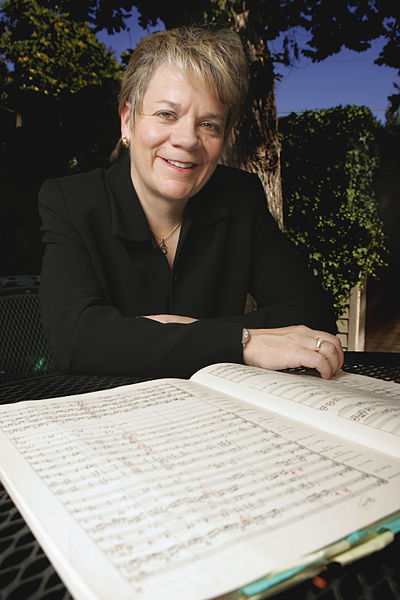Both Alsop and the orchestra know what they’re doing, but the results aren’t quite magical ★★★★☆
As we move towards the 25th anniversary of Bernstein’s death, his one-time protégée Marin Alsop is moving from strength to strength. Music Director at the Baltimore and São Paulo State Symphony Orchestras, Alsop made history in 2013 by becoming the first woman to conduct the Last Night of the BBC Proms. She returns to the prestigious post again this year: but first she has taken the helm of the Orchestra of the Age of Enlightenment (OAE) in an all-Brahms programme.
A period instrument ensemble, the OAE and associated Choir of the Enlightenment (CE) generally focus on Baroque and classical repertoire. But perhaps this is no bad thing, since Brahms was firmly rooted in the old masters – not least Handel, whose influence can be heard clear as day in the Triumphlied (see below). Alsop, meanwhile, has a special relationship with Brahms, having been profoundly moved by his music in her youth.
The Academic Festival Overture, Op. 80, was a gift to the University of Breslau after it awarded Brahms an honorary doctorate. He bases it, fittingly, on student drinking songs, and it seems to communicate a sense of camaraderie. The OAE were rhythmic and driven throughout. At one point the brass seemed a little loose, and at another I think I heard an oboe flail around, as if the orchestra were still warming up. It was a professional performance but it didn’t thrill me.
The Rhapsody for Alto, Male Chorus and Orchestra, Op. 53 – usually known simply as the Alto Rhapsody – came next. Jamie Barton was the soloist, and her magnificently resonant voice easily coped with Brahms’ theatrical writing. The orchestra showed great control, never dominating the texture. At the entry of the chorus the piece began to resemble a requiem, and no less so at the finish, when the C major resolution suggested a kind of Lux Aeterna-type sentiment. All parties showed outstanding dynamic sensitivity. For me, this was the highlight of the evening.
The little known Triumphlied, Op. 55, was composed to celebrate a war victory. In the first movement, the chorus was very clipped, the scales in the strings clean, the dense counterpoint handled very well. But my attention wavered after that. The solo baritone, Benjamin Appl, had a nasal, strained voice, as if he were about to sneeze at any moment. Still, momentum was maintained, and as the sopranos drove upwards towards the end I got back into it.
After the interval came the centrepiece, Brahms’ First Symphony (Op. 68). The orchestra made sweeping statements in the first movement, the strings sometimes lurching in and out of the sound to give added drama. The double basses were suitably ominous, but the strings’ pizzicato dab at the finish came out messy. In the next movement, despite excellent playing, I was never really moved; at the quiet, freeze-frame conclusion, some of the violins were whiney, which rather ruined the moment.
Things picked up in the trio section of the third movement, the rhythmic motifs here eliciting comparison to Beethoven. At the beginning of the fourth the playing was very emotional, and the next section was brilliantly animated. But after that, for me, came twenty minutes of boredom. Only at certain moments – when the brass took the lead, for example, or when Alsop brought out heavy sforzandi – was I brought back into the music. Naturally the final cadences were big and bold, but the performance won’t stick in my memory. As with the rest of the programme, the ability was there, but there was no X Factor.
By Robbie Carney
